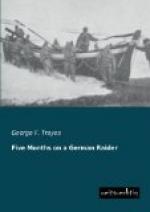CHAPTER I
The capture of the “Hitachi Maru”
The S.S. Hitachi Maru, 6,716 tons, of the Nippon Yushen Kaisha (Japan Mail Steamship Co.), left Colombo on September 24, 1917, her entire ship’s company being Japanese. Once outside the breakwater, the rough weather made itself felt; the ship rolled a good deal and the storms of wind and heavy rain continued more or less all day. The next day the weather had moderated, and on the succeeding day, Wednesday, the 26th, fine and bright weather prevailed, but the storm had left behind a long rolling swell.
My wife and I were bound for Cape Town, and had joined the ship at Singapore on the 15th, having left Bangkok, the capital of Siam, a week earlier. Passengers who had embarked at Colombo were beginning to recover from their sea-sickness and had begun to indulge in deck games, and there seemed every prospect of a pleasant and undisturbed voyage to Delagoa Bay, where we were due on October 7th.
The chart at noon on the 26th marked 508 miles from Colombo, 2,912 to Delagoa Bay, and 190 to the Equator; only position, not the course, being marked after the ship left Colombo. Most of the passengers had, as usual, either dozed on deck or in their cabins after tiffin, my wife and I being in deck chairs on the port side. When I woke up at 1.45 I saw far off on the horizon, on the port bow, smoke from a steamer. I was the only person awake on the deck at the time, and I believe no other passenger had seen the smoke, which was so far away that it was impossible to tell whether we were meeting or overtaking the ship.
Immediately thoughts of a raider sprang to my mind, though I did not know one was out. But from what one could gather at Colombo, no ship was due at that port on that track in about two days. The streets of Colombo were certainly darkened at night, and the lighthouse was not in use when we were there, but there was no mention of the presence of any suspicious craft in the adjacent waters.
It is generally understood that instructions to Captains in these times are to suspect every vessel seen at sea, and to run away from all signs of smoke (and some of us knew that on a previous occasion, some months before, a vessel of the same line had seen smoke in this neighbourhood, and had at once turned tail and made tracks for Colombo, resuming her voyage when the smoke disappeared). The officer on the bridge with his glass must have seen the smoke long before I did, so my suspicions of a raider were gradually disarmed as we did not alter our course a single point, but proceeded to meet the stranger, whose course towards us formed a diagonal one with ours. If nothing had happened she would have crossed our track slightly astern of us.
But something did happen. More passengers were now awake, discussing the nationality of the ship bearing down on us. Still no alteration was made in our course, and we and she had made no sign of recognition.




